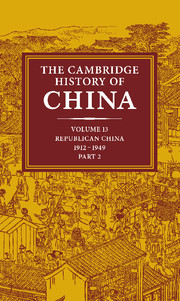Book contents
- Frontmatter
- 1 Introduction: perspectives on modern China's History
- 2 China's international relations 1911–1931
- 3 Nationalist China during the Nanking decade 1927–1937
- 4 The Communist movement 1927–1937
- 5 The agrarian system
- 6 Peasant movements
- 7 The development of local government
- 8 The growth of the academic community 1912–1949
- 9 Literary trends: the road to revolution 1927–1949
- 10 Japanese aggression and China's international position 1931–1949
- 11 Nationalist China during the Sino-Japanese War 1937–1945
- 12 The Chinese Communist movement during the Sino-Japanese War 1937–1945
- 13 The KMT-CCP conflict 1945–1949
- 14 Mao Tse-Tung's thought to 1949
- Bibliographical Essays
- Bibliography
- Conversion table: pinyin to Wade-Giles
- Index
- Republican China - physical features">
- References
13 - The KMT-CCP conflict 1945–1949
Published online by Cambridge University Press: 28 March 2008
- Frontmatter
- 1 Introduction: perspectives on modern China's History
- 2 China's international relations 1911–1931
- 3 Nationalist China during the Nanking decade 1927–1937
- 4 The Communist movement 1927–1937
- 5 The agrarian system
- 6 Peasant movements
- 7 The development of local government
- 8 The growth of the academic community 1912–1949
- 9 Literary trends: the road to revolution 1927–1949
- 10 Japanese aggression and China's international position 1931–1949
- 11 Nationalist China during the Sino-Japanese War 1937–1945
- 12 The Chinese Communist movement during the Sino-Japanese War 1937–1945
- 13 The KMT-CCP conflict 1945–1949
- 14 Mao Tse-Tung's thought to 1949
- Bibliographical Essays
- Bibliography
- Conversion table: pinyin to Wade-Giles
- Index
- Republican China - physical features">
- References
Summary
NEGOTIATIONS AND AMERICAN INVOLVEMENT
By 1944 the American government had become increasingly anxious to quell the dissension that was undermining the anti-Japanese war effort in China, and forestall a possible civil war that might involve the Soviet Union on the side of the CCP once the Japanese surrendered. The negotiations between the KMT and CCP, broken off after the New Fourth Army incident in 1941, had been resumed by 1943. The Americans became actively involved with the arrival in China of Major General Patrick J. Hurley, President Roosevelt's personal representative to Chiang Kai-shek, in September 1944. Appointed US Ambassador a few months later, Hurley's mission was, among other things, ‘to unify all the military forces in China for the purpose of defeating Japan’.
The Hurley mission: 1944–1945
Optimistic interludes to the contrary notwithstanding, the first year of Hurley's efforts to promote reconciliation between the leaders of China's ‘two great military establishments’ bore little fruit. The Communist position announced by Mao at the Seventh Party Congress in April 1945 called for an end to KMT one-party rule and the inauguration of a coalition government in which the CCP would share power. This proposal gained the enthusiastic support of the nascent peace movement in the KMT areas, where fears of renewed civil conflict were mounting as the fortunes of the Japanese aggressor declined. But it was not the sort of proposal that the KMT government was inclined to favour. Then on the day Japan surrendered, 14 August, Chiang Kai-shek invited Mao to journey to Chungking to discuss the outstanding issues between them.
Keywords
- Type
- Chapter
- Information
- The Cambridge History of China , pp. 723 - 788Publisher: Cambridge University PressPrint publication year: 1986
References
- 5
- Cited by

